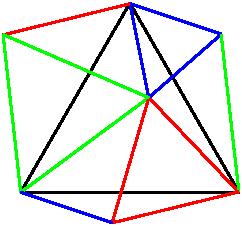How to determine the distance between an arbitrary point inside a triangle and its vertices if side lengths are given. Is there any correlation between these distances or their sum and the lengths of the sides of the triangle?
-
3$\begingroup$ if you only know the dimensions of the triangle, but do not know where inside the point is placed, how would you be able to find the distance between the point and the vertices? $\endgroup$– Carlo BeenakkerCommented Dec 1, 2019 at 12:24
-
$\begingroup$ In the general case, I am interested in the relationship between the lengths of the segments connecting this point with the vertices of a triangle and the lengths of the sides of this triangle. The position of the point is arbitrary, which means - we do not have any additional information or restrictions $\endgroup$– jcewncjewkjckeCommented Dec 1, 2019 at 14:06
-
1$\begingroup$ So, the question is probably not how to determine these distances, but what is a relation between them (since a point has two coordinates, but there are three distances). $\endgroup$– Ivan IzmestievCommented Dec 1, 2019 at 15:47
1 Answer
Let $a, b, c$ be the side lengths of the triangle, and $x, y, z$ the distances from a point inside a triangle to the respective vertices. Then the numbers $x,y,z$ satisfy the equation $$\begin{vmatrix} 0 & 1 & 1 & 1 & 1\\ 1 & 0 & x^2 & y^2 & z^2\\ 1 & x^2 & 0 & c^2 & b^2\\ 1 & y^2 & c^2 & 0 & a^2\\ 1 & z^2 & b^2 & a^2 & 0 \end{vmatrix} = 0$$ This is the Cayley-Menger determinant, for pairwise distances between four points in $\mathbb{R}^3$ it is proportional to the square of the volume of the tetrahedron they span. The volume vanishes if and only if four points are coplanar.
EDIT: Richard Stanley mentioned in his comment that for an equilateral triangle with $a=b=c$ the above condition becomes $$ 3(x^4 + y^4 + z^4 + a^4) = (x^2 + y^2 + z^2 + a^2)^2, $$ which is symmetric not only in $x, y, z$ (as it obviously should be), but also with respect to all permutations of $a, x, y, z$ (which is unexpected). This can be proved by the picture below.
-
3$\begingroup$ If $a=b=c$ then $3(x^4+y^4+z^4+a^4)=(x^2+y^2+z^2+a^2)^2$. It is an interesting exercise to find a noncomputational reason why this equation is symmetric in $x,y,z,a$. (Symmetry in $x,y,z$ is obvious.) $\endgroup$ Commented Dec 2, 2019 at 3:13
-
1$\begingroup$ Yes, indeed. Have not known about this. May I add a picture to my answer? $\endgroup$ Commented Dec 2, 2019 at 8:18
-
$\begingroup$ Sure, you can add a picture. $\endgroup$ Commented Dec 2, 2019 at 15:27

